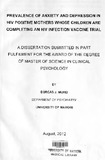| dc.description.abstract | BACKGROUND
The study was carried out to determine the prevalence of anxiety and depression in HIV positive mothers whose infants were participating in a HIV vaccine study. The participants were interviewed when they were exiting the vaccine study. Many pharmacological interventions and vaccine studies have been conducted which thereafter leave psychological problems unaddressed that necessitated this study to be conducted. The findings of this study will be used by Researchers to consider and introduce psychological interventions for HIV positive mothers whose infants are participating in HIV infection vaccine trials or any other studies in future.
OBJECTIVE:
To determine the prevalence of anxiety and depression among HIV positive mothers whose infants were participating in an HIV vaccine trial and find out whether there were any differences with the normal population.
METHODOLOGY:
This study was a cross-sectional survey in which all the one hundred participants were eligible to be interviewed but only ninety five of them consented for this study. All the participants were mothers whose infants were participating in a HIV vaccine trial. A standardized questionnaire was administered that had sociodemographic questions as well as the Beck anxiety (BDA) and Beck depression inventory (BDI) were used. The questions also asked about the participants experiences as their infants participated in the vaccine study. The data collected was analyzed according to the severity of both anxiety and depression. Those who were found to have minimum to mild levels of anxiety and depression were considered to be within normal range that can resolve normally. For moderate to severe anxiety and depression ユ. they required treatment that included referral to Kenyatta National Hospital.
RESULTS
Out of the 95 participants who were intervened, the results can be presented as 4.2% (4) had minimal anxiety, 70.5% (67) had mild anxiety,' 10.5% (10) had
moderate anxiety and 14.7% (14) had severe anxiety. The findings of this study showed that the participants in the lower age were more affected by anxiety than the older participants (P=0.003). The prevalence of depression in this study population was 31.6%. The breakdown of the categories of depression was as follows: 68.4% (65) had minimal depression, 14.8% (14) had mild depression, and 11.5% (11) had moderate depression while 5.3% (5) and 5.3% (5) had severe depression. The participants who were more educated were more likely to be depressed than the ones who had little or no formal education (P = 0.013). Similarly, the participants who were earning less money were more likely to be depressed than their colleagues who were earning more money. (P = 0.000).
In conclusion the research showed that the prevalence of anxiety and depression in the study population was higher than that of the normal population. | en_US |

